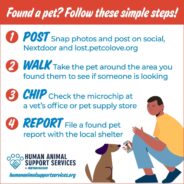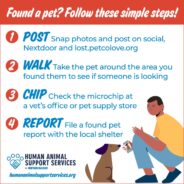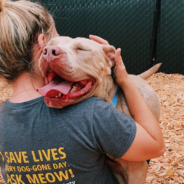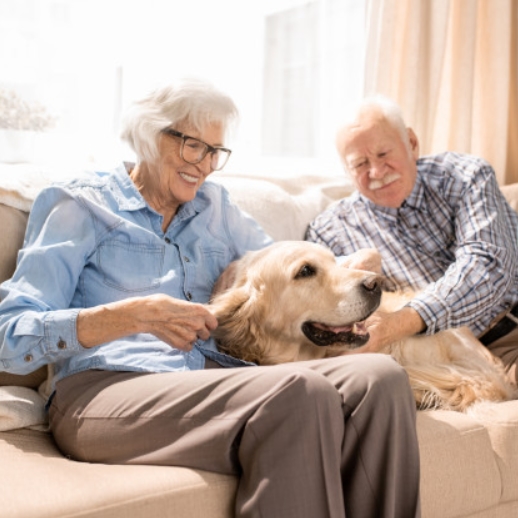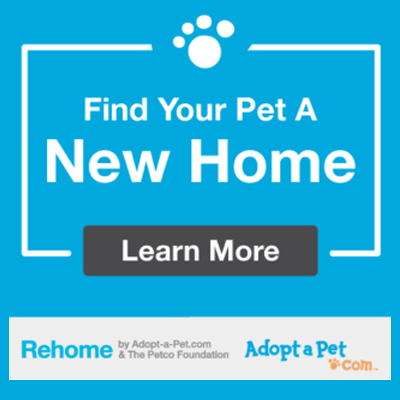Help more people and pets with these webcasts available on demand!
Learning new ways to help people and pets just got even easier! You can now access all of Human Animal Support Services past webcasts in your Maddie’s® University account. There are currently 32 total. Topics span everything from overcoming adoption barriers to taking advantage of staffing shortages. Not sure where to start? HASS: Human Animal Support Services: An Interactive Introduction is a good place. You can also see below for a list of a few more examples, and start watching (and learning) at your leisure! Source: Chew On...
Steal These 11 Ideas! They’re Mostly Free. They Will Make a Difference. We Promise.
Would you like to learn how one animal shelter brought in $10k in donations from one TikTok video? How about how a lost and found texting program doubled a shelter’s return to owner rate, and a totally free fence-fixing program that’s keeping pets from getting lost in the first place? For just over a year now, we’ve been sharing organizations’ best, most innovative, and most *replicable* ideas in our Steal This Idea blog series. Well, here’s a roundup of 11 of our favorites so you can Steal These...
How This County Shelter Is Still Sending About Half Its Pets to Transfer Partners
You don’t need us to tell you how hard things are in animal welfare right now. So when we caught wind of a municipal shelter whose transfer rates to rescue partners hadn’t dropped in 2022, but had stayed robust—with nearly half its pets being transferred to rescue partners—we reached out to find out more. We’re talking just over 2,400 of about 4,800 pets in 2021, and nearly 1,000 of right around 2,000 pets so far in 2022, as of late June. The program is so successful that even now, as a government shelter in the...
5 Kits, Infographics, and Tools to Get More Lost Pets Back Home to Their Families
July 4th has come and gone—and now it’s time to get those lost pets in your kennels back home to their worried families. We’ve rounded up these five kits, infographics, and tools, to help you do just that! 1. HASS x HeARTs Speak Lost Pet Reunification Communications Kit Human Animal Support Services and HeARTs Speak have joined up to create a series of communications kits to help you talk to your community about the critical ways that you are supporting people and pets—including your pet reunification efforts. The lost...
What to Do if You Find a Lost Dog This July 4th
More dogs get lost around July 4th than any other time of year. The vast majority will be picked up less than a mile from their homes—and have a much better chance of being reunited with their families, if some actions are taken in the neighborhoods where they’re found, before they are brought to a shelter! Anyone who finds a lost pet around the holiday, or at any time, should follow these steps to help them get home, if they are able: Snap photos of the pet and post to social media like lost and found pet groups on Facebook. They...
Why Is It So Hard to Volunteer to Help Pets?
Here’s how it usually works when you go to volunteer in an animal shelter: Fill out a long application. Wait. Maybe hear back about a volunteer orientation to be held in the next two months. Maybe be told there are no upcoming orientations. Eventually attend a 3-hour seated orientation in a room with a screen and a canned presentation. Wait. Get invited to start volunteering. Show up. Feel really confused. Try to figure it out. Get told by (insert any person here) that you’re breaking one or more rules. ...
HASS Partners: Waggle and Maddie’s Fund® Are Giving Away $100k to Cover Veterinary Bills for Owned Pets
This offer is open to all HASS partner organizations. Here’s how to participate. There’s $100,000 available for all of our partner organizations to help owned pets get medical care and make sure a veterinary bill doesn’t break up a family. Waggle, a nonprofit crowdfunding platform dedicated to helping organizations and individuals raise money for pets’ veterinary costs, has earmarked $50,000, and Maddie’s Fund® is contributing another $50,000 to provide $500 matching grants for each campaign posted by a HASS...
This Understaffed Animal Shelter Threw Open Their Doors and Invited Everyone to Apply for Jobs
Like so many shelters, SPCA Serving Erie County in West Seneca, NY, is having a difficult time getting and staying staffed. With a lot of open positions to fill, and the usual recruitment techniques proving inadequate, director Caitlin Daly had an idea: What about holding an open interview event, for anyone interested in working for or learning about the organization? So on May 12, they did just that—and then hired about 10 of the 80-some people who showed up that day. Relationships were built with others of the applicants,...
This Shelter Started a Lost and Found Texting Program and Got Twice as Many Dogs Home
About a year and a half ago, Greenville County Animal Care in South Carolina set up a lost and found pets texting program. People who’ve lost a pet text the word LOST to 864-467-3950, and receive an instant reply with information about how to file a lost pet report, and other steps to help locate the missing pet. Those who’ve found a pet text the word FOUND to the same number. “We’ll text you all of the information and tips you need to help you reunite the cat or dog you found with its lost owner!” GCAC...
Implement pet support services with this free course
Looking to add more pet support services for your community? Maddie’s® University’s free, self-paced course, Pet Support Services, is for you! By offering pet support services, you will help keep pets with their families and out of your shelter. Pet Support Services programs are not hard to implement; you can start by retraining your current intake staff and giving your field officers the tools and training they need. You can scale your program as you listen to your community members, discover the gaps in your current...




